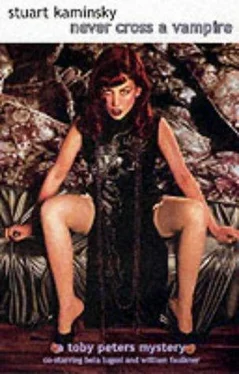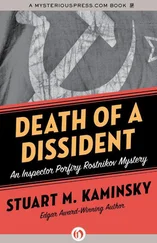Stuart Kaminsky - Never Cross A Vampire
Здесь есть возможность читать онлайн «Stuart Kaminsky - Never Cross A Vampire» весь текст электронной книги совершенно бесплатно (целиком полную версию без сокращений). В некоторых случаях можно слушать аудио, скачать через торрент в формате fb2 и присутствует краткое содержание. Жанр: Криминальный детектив, на английском языке. Описание произведения, (предисловие) а так же отзывы посетителей доступны на портале библиотеки ЛибКат.
- Название:Never Cross A Vampire
- Автор:
- Жанр:
- Год:неизвестен
- ISBN:нет данных
- Рейтинг книги:5 / 5. Голосов: 1
-
Избранное:Добавить в избранное
- Отзывы:
-
Ваша оценка:
- 100
- 1
- 2
- 3
- 4
- 5
Never Cross A Vampire: краткое содержание, описание и аннотация
Предлагаем к чтению аннотацию, описание, краткое содержание или предисловие (зависит от того, что написал сам автор книги «Never Cross A Vampire»). Если вы не нашли необходимую информацию о книге — напишите в комментариях, мы постараемся отыскать её.
Never Cross A Vampire — читать онлайн бесплатно полную книгу (весь текст) целиком
Ниже представлен текст книги, разбитый по страницам. Система сохранения места последней прочитанной страницы, позволяет с удобством читать онлайн бесплатно книгу «Never Cross A Vampire», без необходимости каждый раз заново искать на чём Вы остановились. Поставьте закладку, и сможете в любой момент перейти на страницу, на которой закончили чтение.
Интервал:
Закладка:
“Is he there?” I tried. “Or anyone more than three feet tall?”
“He’s working a movie. He’s a doctor.”
Someone took the phone away from the boy.
“Hello,” I shouted.
“Mr. Peters,” came a woman’s voice.
“Right,” I said.
“Mister Lugosi is at the studio, Monogram, shooting. He wanted to know if you could meet him there. He said it was rather important.”
“What was it about?” I asked, taking off my wet jacket and watching the trickling trail from my clothes creep down the stairs behind me. “He didn’t say,” the woman said. Her voice was pleasant, efficient, and strong, and she was ignoring the boy in the background demanding something that sounded like “Skpupsh.” She told me where Monogram was, but I didn’t need the information. I needed another bath and a large towel. I thanked her, hung up, and made it to my room, where I left a trail of discarded wet clothes on the way to my mattress on the floor. Two days earlier I had been thinking of picking up a few dollars by pumping gas. Now I was floating in clients and water.
Ten minutes later, I forced myself up, rebandaged my leg, gulped a few more of Shelly’s pain pills, and put on my second suit, which was too light for the weather and too dirty for society. I tried not to think about the rain that was telling my bad back to beware. Maybe I succeeded. Maybe my old theory that the body can tolerate only one major pain at a time was true. Come to think of it, it wasn’t my theory. I got it on a Shadow radio show from a mad scientist who was torturing a girl he wanted to turn into a gorilla. I’d have to tell Phil my pain theory the next time he tried to hit me with a desk.
And still I waited, looking out at the falling rain, knowing I had a block to go to my car, knowing my coat would be of no use. A large bowl of Grape Nuts mixed with puffed rice and too much sugar helped. I felt better, but wasn’t thinking any better. The rain looked as if it was stopping or at least taking a dinner break. Giving myself a pep talk about responsibility and financial security, I braved the elements, scanning the street for the dark Ford. There were a few parked on the street, but they had been there when I came in. Almost all the cars in the world were a solid dark color, except mine. A lot of those cars were Fords.
I stopped for some gas at a station downtown on North Broadway and drove past the Los Angeles River viaduct. I remembered from somewhere in high school history back in Glendale that this had once been the center of an Indian village, home of the Gabrielino Indians. They had been a branch of the great Uto-Aztecan family, which spread across North America from Idaho south to Central America. At one time twenty-eight Indian villages existed in what was now Los Angeles County.
The Indians, according to what I had been told, were among the most peaceful in North America. They seldom warred. Robbery was unknown, and murder and incest were punishable by death. They believed in one deity, Qua-o-ar, whose name never passed their lips except during important ceremonies, and then only in a whisper. The men seldom wore clothes and the women wore only deerskins around their waists. When the weather got rough, the Indians wrapped themselves in sea otter fur. Their homes were woven mats that looked like beehives. They had no agriculture, and they didn’t know how to domesticate animals. They lived on roots, acorns, wild sage, and berries and-when they could catch them-snakes, rodents, and grasshoppers. Their weapons were sticks and clubs. They didn’t know how to make bows. Los Angeles had come a long way in a few hundred years.
Monogram in 1942 was a thriving, catch-as-catch-can operation with some studio space, but not much, and a lot of shooting in the park to save a few dollars. There was no big, fancy gate and regiment of uniformed guards, but they did their best to keep up appearances. An old guy in a gray jacket and cap, who looked as if he had been riding horses for a century, hurried out to my car when I pulled up.
“Yeah?” he said. “Right,” I came back. “I’m here to see Bela Lugosi. I’m doing a job for him.”
“Peters?”
“Right.”
“He said you might be coming. I thought he might be pulling my leg. He’s got one screwy sense of what’s funny sometimes.” The old guy waved me in and put his hands on his hips. He smiled after me. There wasn’t any need to tell me where to find Lugosi. The place wasn’t that big. I just followed the sounds past low buildings to a sound stage about half the size of anything at Warner Brothers. In a space marked for Sam Katzman, I parked behind a truck with a rusting rear door and moved as quickly as I could on my aching leg to the entrance. My attempt at speed was prompted by a desire to keep warm without a coat and not by any particular zeal for the job at hand.
The light over the door was off, indicating that no shooting was going on. Two guys, one Oriental, the other huge, were talking in front of the door about the Chicago Bears-Pro All-Stars game the next day. The Oriental guy was saying something about Sammy Baugh when I went through the door.
The stage was well lighted. The set in front of me was a phony jungle with a little hut. Three guys were huddled around a camera and from their anxiety I guessed they were having trouble with it. Lugosi, wearing a dark suit and thick makeup, was seated on a crate outside the range of lights smoking his cigar. He spotted me, stood up, and advanced on me into the shadows away from the others.
“Ah, Mr. Peters, good of you to come,” he said. “I could not reach you, and I did not want to leave a message at home for reasons you will no doubt understand.”
He was nervous and it was affecting his accent, which became more pronounced. Doubt had come out “dutt,” but there was no trouble understanding his concern.
“Before I left for the studio this morning,” he said, removing his cigar, “I got a phone call, a man, a voice I did not know, with an accent, if you will believe, stronger than my own. This man said, ‘We are going to get you now. You have only days to live.’ Then he said I knew who he was.”
“Either we have a new player,” I said, “which isn’t likely, or our friend has gone another step and changed his pattern: a direct threat on the telephone.” “Shall I call the police, ask for protection?” he asked.
“You can try, but I don’t think you’d get it, and the police can’t watch you forever. I can’t even do that. The trick is to find our friend as fast as possible. I’ll get on it.”
“Thank you,” Lugosi said seriously, pumping my hand.
“Ready in a few minutes, Bela,” a voice came from the group gathered around the camera. Lugosi waved to the men to let them know he was ready, and a young woman with a script in her hand ran to the stage door and called in the two men outside.
“Excuse me,” Lugosi said. “We have to work quickly. Time is money. I am the most expensive part of this film and it is a modest expense.”
I walked with him toward the set while the Oriental who had mentioned Sammy Baugh moved in front of the lights, waiting for Lugosi.
“What’s the picture?” I asked.
Lugosi shook his head and smiled sadly.
“A very timely epic written last week and not yet finished. It’s called The Black Dragon. I play a plastic surgeon who transforms Japanese into Occidentals so they can spy on America. In the end, I am to receive ironic justice for this misdeed. It goes on. I look in the mirror in the morning and I say to myself, ‘Can it be that you once played Cyrano and Romeo?’ Always it is the same. When a film company is in the red, they come to me and say, ‘Okay, so we make a horror film.’ And so that is what we do, what I always do. And I do my best. That is the trick.” He adjusted his tie, took a last puff on his cigar. “Always play it seriously no matter what the material. And always talk slowly so you will have more screen time.”
Читать дальшеИнтервал:
Закладка:
Похожие книги на «Never Cross A Vampire»
Представляем Вашему вниманию похожие книги на «Never Cross A Vampire» списком для выбора. Мы отобрали схожую по названию и смыслу литературу в надежде предоставить читателям больше вариантов отыскать новые, интересные, ещё непрочитанные произведения.
Обсуждение, отзывы о книге «Never Cross A Vampire» и просто собственные мнения читателей. Оставьте ваши комментарии, напишите, что Вы думаете о произведении, его смысле или главных героях. Укажите что конкретно понравилось, а что нет, и почему Вы так считаете.












